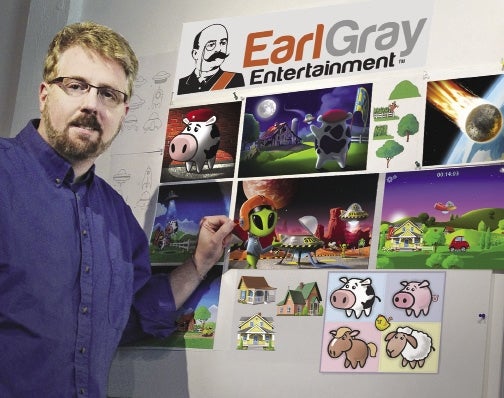The video game industry in Massachusetts is reaching new levels of growth, with no signs of stopping.
Last month, a survey by the Massachusetts Digital Games Institute (MassDiGI) found that the industry grew 78 percent in the Bay State in the past three years, with 124 organizations employing more than 2,000 people.
It also found that 28 companies were launched in the past two years, compared to 26 over the previous four.
On a large scale, that growth can be attributed to a change in the industry. As recently as five or 10 years ago, it was driven by major companies creating games for consoles and computers. But today, new technology has changed that.
“The big guys were focused elsewhere. This was a classic case of innovative disruption,” said Timothy Loew, executive director at MassDiGI, based at Becker College in Worcester. “Large companies that have been working on major games for consoles that cost $30 (million) or $40 million to make are competing head to head with small startups for consumers, and that is a fairly a significant change.”
Loew and others in the industry say that disruption and startup interest in game development came from innovations like the iPhone and Android systems that run games that are inexpensive to produce and allow people to take their games everywhere.
Mark Claypool, director of the interactive media and game development program at Worcester Polytechnic Institute, said the number of independent gaming studio startups with one to five people is growing, perhaps faster than any other area of the industry. Not only is that due to people playing games for entertainment, but also because of “serious” games being used for educational purposes by schools and businesses.
“It’s easier now to do games than it used to be,” he said. “To get your game to make money, it needed to end up at Best Buy. The barrier to get games to a market … is a lot easier now. It’s a wider distribution channel.” New tools also make development easier.
Earl Gray Entertainment of Worcester is a father-and-son startup that has taken advantage of that low barrier, starting with virtually no experience and little capital.
Kevin Grimm of Marlborough had been in the graphic design industry for 25 years with a background in animation. His son, Chris, who lives in Connecticut, graduated with a degree in political science, but loved gaming and dabbled in writing computer code.
Chris said he started teaching himself to program with the goal of making “something” appear on his iPhone. When he managed to get a “poorly drawn man” to fly around on his phone, he asked his dad whether he wanted to make art for the game.
The two quickly realized how well their skills complemented each other’s. In November 2011, the pair launched their company and released their first game for iPads and iPhones — “MILQ – The Quest”— through Apple’s App Store in June. They said it’s already been downloaded thousands of times and they’re working on their second game.
In an email, the elder Grimm said, “I don’t think we could have done this prior to smartphones, at least not with the same prospect of success. The barrier for entry into this market right now is the lowest it has ever been and that definitely had an impact on our decision to give it a shot. Had it been 10 years ago, I don’t think the market would have allowed for us to start a studio with so little resources and what is essentially no experience.”
Kevin and Chris live 100 miles apart and chose a Worcester base because of its central location. But they believe that as industry growth continues around Boston, more developers will seek out affordable locations in Central Massachusetts.
Also fueling growth in the region are educational programs.
“There has been for an overall expansion of the industry everywhere,” Loew said. “Of course our rate is even greater than what the general industry’s rate of growth has been, and that’s likely due to the talent coming out of the colleges and universities here.”
Aside from the WPI and Becker programs, Loew said Quinsigamond Community College and Fitchburg State University are considering their own.
Jeff Warmouth, communications media professor at Fitchburg State, is leading the effort to bring a game design major to the school. He said the program’s plan is being evaluated by the state Board of Higher Education and he hopes it’ll be approved for implementation in the fall of 2013.
Part of the driving force behind the new major, he said, was that students want it. Warmouth said the school had been monitoring the most common search terms for majors that were unavailable and found game design as the most popular.
He said many of his department’s students and alumni end up working or interning at game development companies making the most of the program available to them. He’s seen an increased awareness within the local industry in recent years.
“We’re really kind of responding to the fact that there is a big industry here,” Warmouth said.
He also thinks that the implementation of programs like Fitchburg State’s will help the region in the long run, because of the high percentage of students at public colleges who decide to live in the areas where they went to school.
Loew: Incubator Could Help
Loew said the industry in Central Massachusetts could also be aided by an incubator that could help developers transition from students to entrepreneurs — it’s something MassDiGI is pursuing.
He also believes state incentives could be beneficial. He said 22 states offer tax incentives for game development and that Quebec has seen a seven-fold increase in industry growth since implementing them in 2003.
“In order for Massachusetts companies to compete on an even playing field with those other jurisdictions, conversations about responsible, accountable tax incentives make sense if we’re interested in fostering even stronger growth,” he said.
Read more
Survey: Mass. Digital Games Industry Growing

